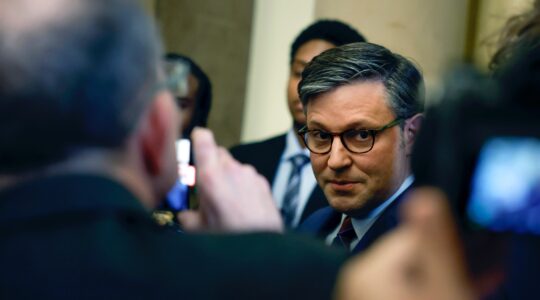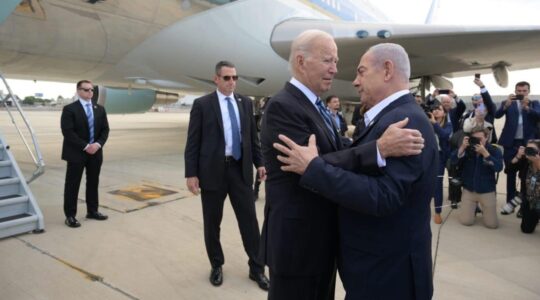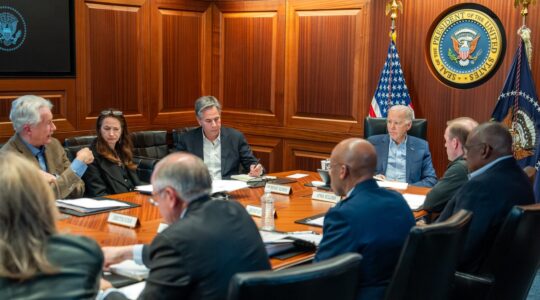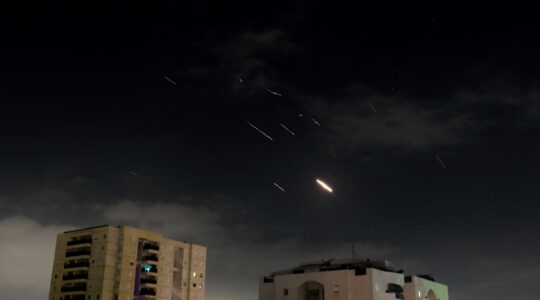
Hadassah members take part in a rally Sept. 24, 2009 near the United Nations against Iranian President Mahmoud Ahmadinejad and the regime in Tehran. (Courtesy of Hadassah)
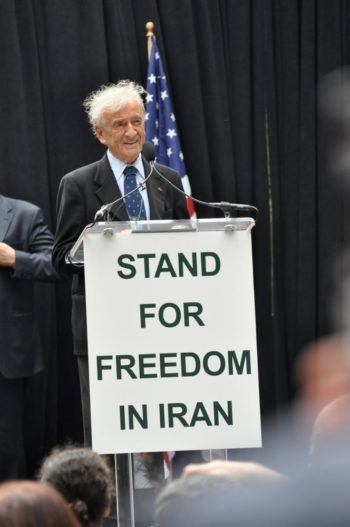
Nobel laureate Elie Wiesel speaks at the New York rally against the Iranian government on Sept. 24, 2009. (Courtesy of Hadassah)

A protester at the Sept. 24, 2009 rally in New York against the Iranian regime holds up a sign portraying Iranian President Mahomoud Ahmadinejad as a Nazi. (Dave Alvarez)
Thousands of protesters turned out for the Sept. 24, 2009 rally in New York against the Iranian regime. The event was organized by Jewish groups, in conjunction with numerous non-Jewish organizations. ()
WASHINGTON (JTA) — With Iran, it always comes back to the nuclear issue.
The revelation last Friday that Iran has a second secret uranium-enrichment plant — with a “configuration” inconsistent with peaceful intent, according to President Obama — has placed the Islamic Republic’s nuclear program front and center, spurring momentum in Congress, at the White House and in Europe on potential sanctions that U.S. officials describe as “crippling.”
Ahead of Thursday’s meeting in Geneva between Iranian officials and representatives of the United States and five other major powers — a summit arranged before last week’s revelations as part of the U.S. president’s engagement policy — Obama said he would demand an Iranian commitment to cooperate with the International Atomic Energy Agency, the United Nations nuclear watchdog.
“At that meeting, Iran must be prepared to cooperate fully and comprehensively with the IAEA to take concrete steps to create confidence and transparency in its nuclear program and to demonstrate that it is committed to establishing its peaceful intentions through meaningful dialogue and concrete actions,” Obama said.
Iran’s leaders continue to insist that their program is peaceful and that they are complying with IAEA rules. But it didn’t help their argument that over the weekend Iran tested missiles capable of reaching Israel, parts of Europe and U.S. forces in the Middle East — tests apparently scheduled long before the revelations.
News of the secret plant threatened to obscure the human component of the threat posed by Iran’s leadership: the one directed at the Iranian opposition, which charges that the June 12 election was stolen by the regime. For a while, talk of centrifuges and a potential nuclear threat was overshadowed by images like that of the young woman gunned down during an election protest whose last moments were captured on video and posted on YouTube, the video-sharing Web site.
The result was a previously unimaginable collusion of interests between pro-Israel groups that had been pressing for sanctions and liberal groups that had opposed them. Both now are making the case that the Iranian regime represents an extremist and dangerous threat — albeit separately, for the most part.
“The time is now, not months from now, to determine the most effective and impactful sanctions and implement them,” said a statement from the Conference of Presidents of Major American Jewish Organizations, the Jewish community’s foreign policy umbrella group. “Should the U.N. Security Council not be able to muster the votes necessary, then Europe, the U.S. and other nations should act outside of the framework of that body.”
So far, European countries appear to be taking a tougher stance on Iran than Obama. French President Nicolas Sarkozy and British Prime Minister Gordon Brown joined Obama on stage last Friday in Pittsburgh, at the G-20 industrial summit, to sound ominous warnings to Iran.
Brown spoke of “further and more stringent” sanctions, and Sarkozy said the sanctions could begin as soon as December.
It remains to be seen whether Russia and China will join expanded and enhanced sanctions. Russian President Dmitry Medvedev says he prefers negotiations, although he acknowledged last week that sanctions may be inevitable. China pressed Iran to cooperate with the IAEA.
The Washington Post reported Tuesday that the Obama administration was prepared to go it alone by enhancing existing sanctions against dealing with Iran’s banks and imposing new sanctions targeting insurers and reinsurers of its energy sector.
A senior European diplomat told JTA that the European Union is also ready to join the United States in enforcing sanctions outside the boundaries of the Security Council, although the Europeans preferred to bring the Russians and Chinese on board. Sarkozy’s December deadline for Iran to make good on Western demands reflected a European-Obama administration consensus, the diplomat said.
The U.S. Congress, too, is ratcheting up the pressure.
Rep. Nancy Pelosi (D-Calif.), the speaker of the House of Representatives, and Rep. Howard Berman, the body’s Foreign Affairs Committee chairman, said they were prepared to advance far-reaching sanctions legislation.
Berman, with Pelosi’s backing, has resisted moving the Iran Refined Petroleum Sanctions Act out of his committee in the hope that Obama’s policy of engagement would prove fruitful.
“We must use the tools at our disposal, from diplomacy to sanctions, to stop Iran’s march toward nuclear capability,” Pelosi said in a statement.
In a Washington Post Op-Ed, Berman made clear he was skeptical that this week’s talks would produce anything tangible.
“We should be ready immediately to impose what Secretary of State Hillary Clinton has called ‘crippling sanctions,’ ” Berman wrote.
The revelation of the existence of the nuclear plant — beneath a Revolutionary Guards base near Qom, Iran’s holy city — apparently have won over even the most sanctions-skeptical U.S. lawmakers, among them Sen. John Kerry (D-Mass.), Berman’s Senate counterpart.
“Now is the time to supplement engagement with more robust international sanctions,” Kerry said in a statement.
The bill in Congress under discussion mandates sanctions targeting the export of refined petroleum to Iran. Though the Islamic Republic is a major oil producer, its refineries are in shambles and the country imports up to 40 percent of its refined oil.
Pro-Israel insiders say they back Berman’s timetable — to pass it before Congress’ winter break so that Obama can sign it in early 2010.
